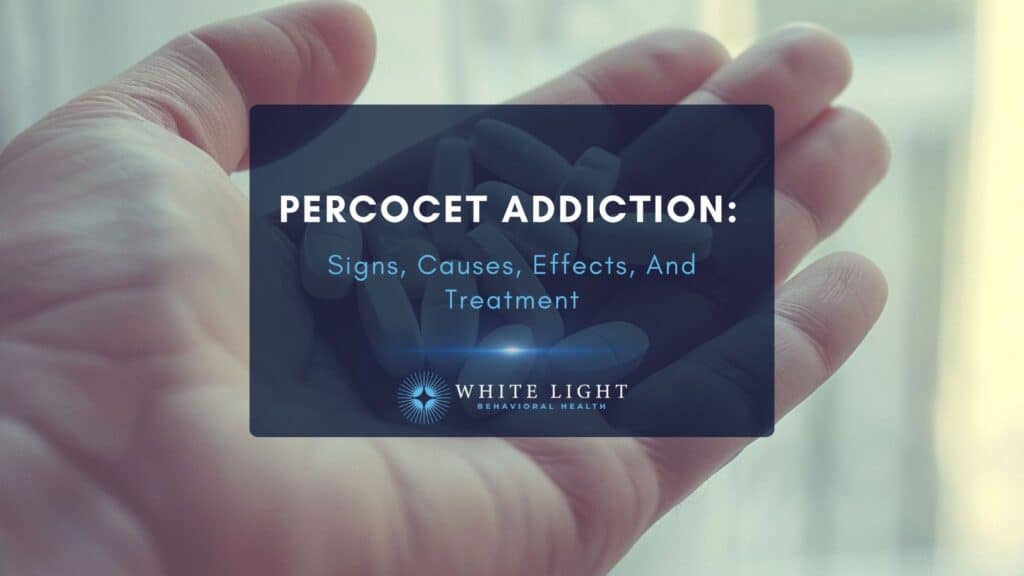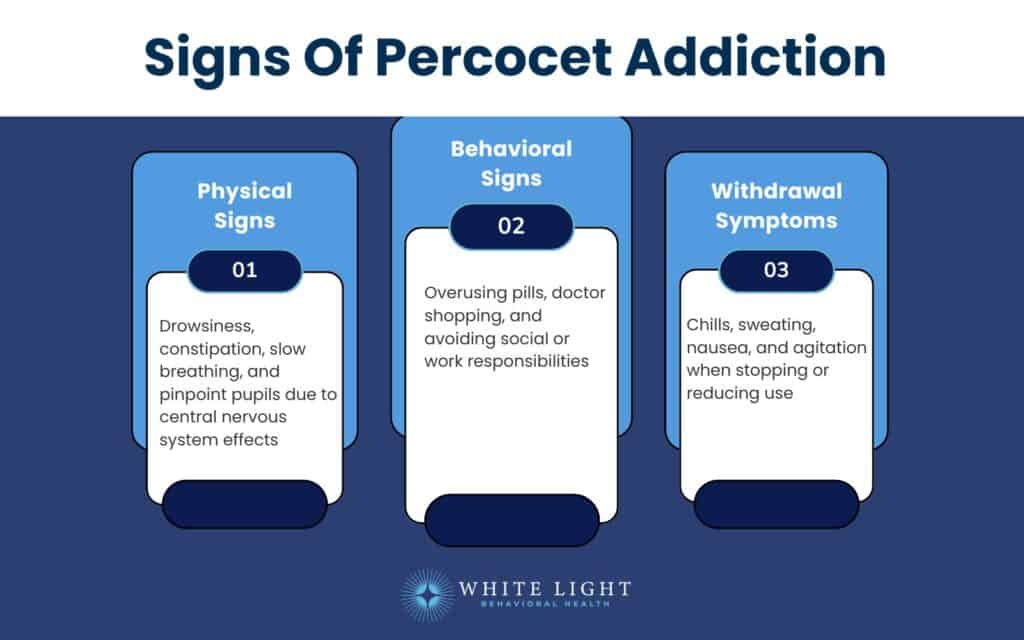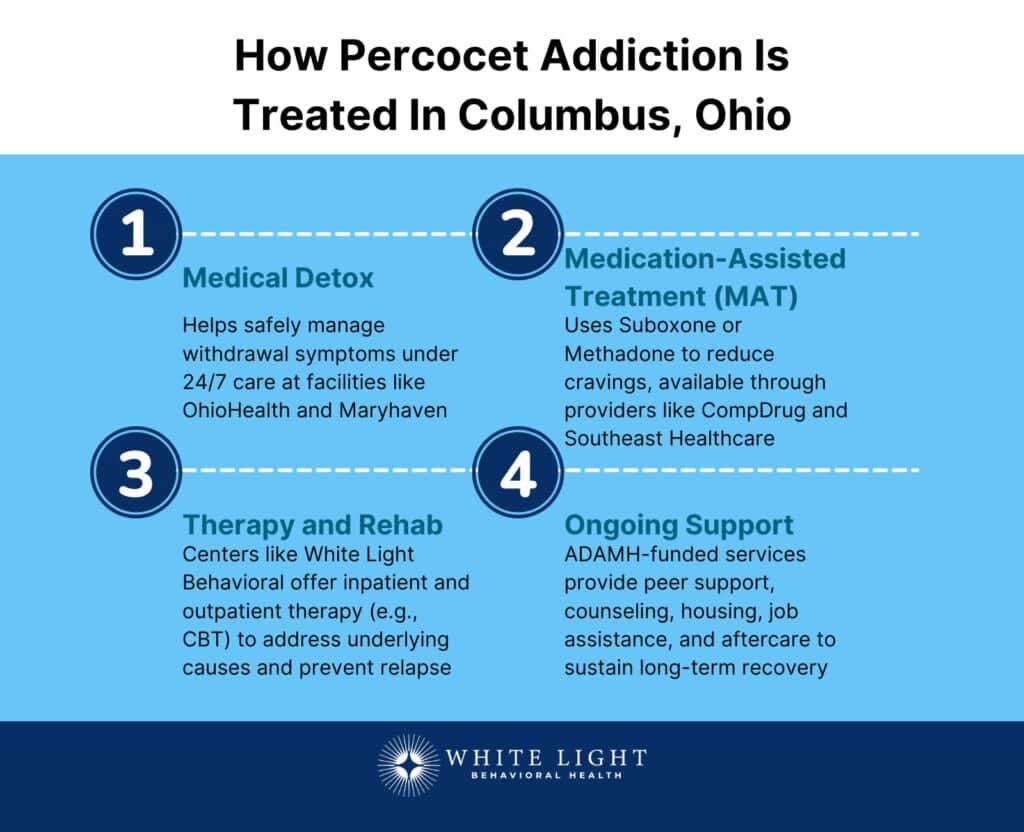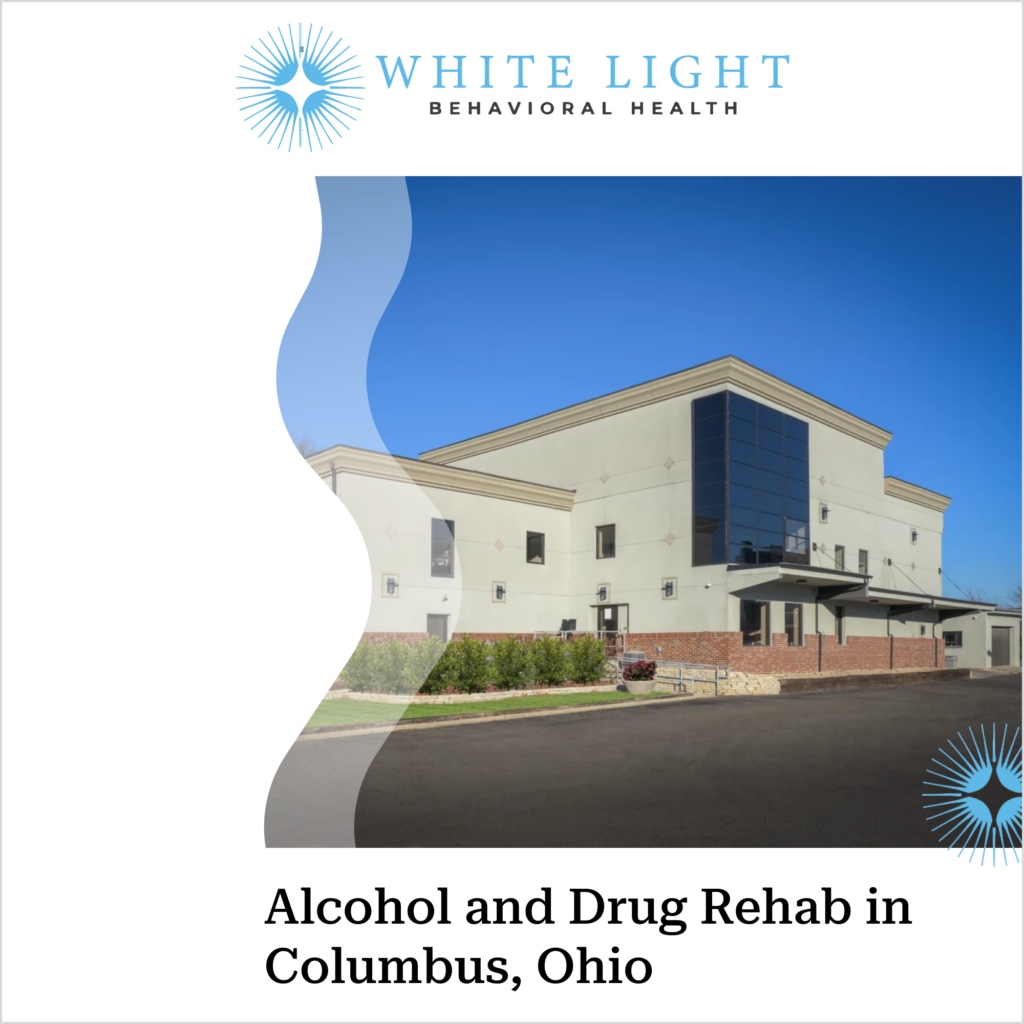Percocet Addiction: Signs, Causes, Effects, And Treatment

Percocet addiction begins when short-term pain relief becomes long-term dependence. In Columbus, many residents have faced this shift, from surgery or injury to silent dependency. If you’re living this reality, you’re not alone, and real help exists here in Franklin County.
According to the Franklin County Coroner’s Office (2023), 81% of all unintentional overdose deaths involved opioids, including oxycodone, the opioid in Percocet. Local providers report rising treatment admissions tied to prescription opioid misuse.
Signs of Percocet addiction include increased tolerance, withdrawal symptoms, and using the drug outside prescribed limits. Common causes range from unmanaged pain to emotional stress or past trauma. Effects are physical, like liver damage and sedation, and psychological, including anxiety and depression. Treatment for Percocet addiction involves medically supervised detox, behavioral therapy, and long-term relapse prevention strategies.
What Is Percocet Addiction
Percocet addiction is a chronic condition marked by compulsive use of the prescription drug Percocet, even when it causes harm. It develops when your brain begins to rely on the drug’s chemical effects to manage pain, emotion, or daily function, leading to tolerance, dependence, and ultimately, loss of control.
Percocet combines oxycodone (a powerful opioid) with acetaminophen. Over time, its repeated use rewires the brain’s reward system, making it difficult for you to feel normal without it. You start taking higher doses or more frequent doses than prescribed, or seek it through non-medical means.
According to the National Institute on Drug Abuse (NIDA, 2023), nearly 2.7 million Americans live with an opioid use disorder, many of whom began with prescription opioids like Percocet intended for short-term pain relief.
Did you know most health insurance plans cover substance use disorder treatment? Check your coverage online now.
What Is Percocet
Percocet is a prescription medication that combines two ingredients: oxycodone, an opioid pain reliever, and acetaminophen, a non-opioid pain reducer. It is prescribed for moderate to severe pain, particularly following injury or surgery.
Oxycodone works by binding to opioid receptors in your brain and spinal cord, blocking pain signals and producing a sense of calm or euphoria. Acetaminophen enhances pain relief but also poses a risk of liver damage at high doses. Together, these components make Percocet effective, but also addictive when misused.
Because Percocet quickly creates feelings of pleasure, some users begin taking more than needed. Over time, that behavior spirals into dependency.
Why Is Percocet Addictive?
Percocet is addictive because oxycodone triggers the brain’s reward system, flooding it with dopamine and reinforcing repeated use. The euphoric sensation it creates becomes psychologically desirable, while the body builds physical tolerance and dependence.
More Resources on Addiction:
With continued use, your brain adapts by reducing its natural dopamine production. You begin to rely on the drug just to feel normal.
This cycle of chasing relief and avoiding withdrawal fuels addiction. Even when pain subsides or a prescription ends, cravings continue.
The presence of acetaminophen disguises just how much oxycodone you’re taking, raising overdose risk. This combination makes Percocet uniquely risky for both short-term misuse and long-term dependence.
What Are The Signs Of Percocet Addiction?
The signs of Percocet addiction include physical changes, behavioral disruptions, and withdrawal symptoms that reveal deepening dependence. These signs appear together and escalate without intervention.

The signs of Percocet addiction are:
- Physical signs: Drowsiness throughout the day, chronic constipation, slowed or shallow breathing, and noticeably pinpoint pupils. These effects are direct responses to the drug’s action on the central nervous system.
- Behavioral signs: Taking more pills than prescribed, visiting multiple doctors to obtain extra prescriptions (doctor shopping), and withdrawing from friends or responsibilities.
These behaviors show the shift from controlled use to compulsive need.
- Withdrawal symptoms: Chills, excessive sweating, nausea, and intense agitation when the drug is reduced or unavailable. These symptoms begin quickly and make quitting without support extremely difficult.
What Causes Percocet Addiction In Columbus, Ohio?
The factors that cause Percocet addiction in Columbus, Ohio, include prolonged medical use, emotional self-medication, and widespread availability. These causes intersect across healthcare, mental health, and community access.

The factors that cause Percocet addiction in Columbus, Ohio, are:
- Long-term use for injury or post-surgical pain: Percocet is commonly prescribed after surgery or accidents. When used for extended periods, the body develops tolerance, requiring higher doses.
This medical pathway is one of the most frequent starting points.
- Self-medication for stress, trauma, or mental health issues: People coping with anxiety, PTSD, or depression use Percocet to numb emotional pain. Over time, reliance on the drug replaces healthy coping mechanisms, deepening psychological dependence.
- Easy access through prescriptions and illicit street supply: While legally prescribed, unused pills circulate informally.
Columbus law enforcement and treatment centers report growing availability of Percocet and counterfeit versions on the street.
What Are The Effects Of Percocet Addiction?
The effects of Percocet addiction include health complications, psychological decline, and disruptions to social life. These outcomes affect every part of your stability and well-being.

The effects of Percocet addiction are explained below:
- Health effects: Liver damage from excessive acetaminophen use, slowed or impaired breathing due to oxycodone, and increased risk of overdose, especially when combined with alcohol or other depressants. These outcomes grow more severe with long-term or unsupervised use.
- Mental effects: Heightened anxiety, deepening depression, and unpredictable mood swings.
As dependency deepens, your emotional state becomes harder to regulate without the drug.
- Social effects: Strained family ties, job instability or loss, and possible arrest or legal trouble due to drug-related behaviors. Addiction isolates users from their support systems and responsibilities.
Contact us today to schedule an initial assessment or to learn more about our services.
Whether you are seeking intensive outpatient care or simply need guidance on your mental health journey, we are here to help.
How Is Percocet Addiction Treated In Columbus, Ohio?
To treat Percocet addiction in Columbus, Ohio, recovery programs include detox, medication, structured rehab, and long-term community support. These methods work together to help you recover physically, emotionally, and socially.

- Medical detox: Detox is the first step in treatment, helping your body clear the drug while managing nausea, sweating, and agitation. Local facilities like OhioHealth and Maryhaven offer 24/7 monitoring for safe withdrawal during medical detox.
- Medication-assisted treatment: Suboxone or Methadone medications reduce cravings and block opioid effects. CompDrug and Southeast Healthcare provide MAT as part of daily or weekly treatment plans.
- Therapy and rehab: Addiction recovery centers like White Light Behavioral offer outpatient or inpatient therapy, including CBT and motivational interviewing, to address triggers, trauma, and relapse risk.
- Ongoing support: The ADAMH-funded services provide recovery coaches, support groups through peer groups, counseling, and case management, and help with housing, employment, and follow-up aftercare treatment.
Where To Get Help For Percocet Addiction In Columbus
To get help for Percocet addiction in Columbus, you have immediate and accessible options across Franklin County. The first step is reaching out to the Franklin County Crisis Line at (614) 276-2273, which offers 24/7 guidance and referrals to urgent care facilities.
Walk-in recovery centers and outpatient clinics provide detox, therapy, and medication support. These facilities are spread throughout Columbus, with same-day intake available in many locations.
State-funded programs and sliding-scale treatment are available through ADAMH Board providers. These options ensure that you receive care regardless of your insurance or income status. Immediate, confidential help is always within reach.
Share This Post














